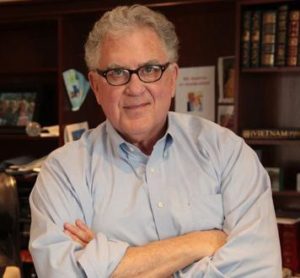The result of the presidential election a couple of months ago has now been certified by the U.S. Senate, Vice President Mike Pence presiding. Joe Biden is now, officially, the president-elect.
But it didn’t come easy.
As every banker and probably e

very bank customer knows by now, our nation withstood an assault on the sacred grounds of the U.S. Capitol building in Washington. If you watched what I watched, you are likely shaking your head in disbelief, looking for answers to questions where there are none.
Normally we don’t get involved with presidential politics at the OBA level. We leave it to the ABA and the ICBA, primarily because they’re there every day, while we are not. But when presidential “politics” impacts your business, as it has now done, we notice it.
On Jan. 5, we collectively lost the only chip we had left on the table. Georgia’s unusual runoff election was conducted, and the Republican-controlled Senate emerged as the final step to one-party rule in D.C. Part of the reason the two Georgia seats were lost is because the president’s consistent message was only about how he got screwed.
Many of us thought, if the Senate had stayed in Republican control, we (the banking industry) had a better shot at maintaining some semblance of order and discipline, without a great deal of change in both policy and regulatory issues impacting your business. I’m not being partisan here, and I’m not some Republican hack or Trump supporter to the end. But I am a realist.
Our system for governance in this country under the provisions of our Constitution prevailed, following what can only be described as an attack by domestic terrorists on our nation’s Capitol building. Even though both the House and Senate chambers were briefly occupied by elements of the mob that descended on Capitol Hill, collectively, as a nation, we survived the onslaught and Congress went on its way to perform its duty of certifying the 2020 election results.
Most of us – my colleagues across the country, the ABA and the ICBA – were all hoping for keeping the Senate in Republican hands. I don’t know about the others, but our hope to maintain Republican control of the Senate here at the OBA was not because we’re Republicans or Trump supporters: It was because we believed it’s better for banking if the federal government was NOT controlled by a single party.
Like it or not, at the OBA staff level we have always believed it’s better to have a “wall” of political separation in place as a safety valve. The fear is always if we don’t such a safety wall, some of the crazies in the prevailing majority (on both sides of the aisle) would attempt to implement measures to make your business much more difficult. That’s what happened in 2010 when Congress passed the Dodd-Frank Act.
“So, Beverage, what the devil are you talking about?” you may ask. We’ve had a pretty good banking environment over the past four years, especially since 2018. For example, there has been less burdensome regulation that enables you to better serve your customers.
Federal banking regulators have been more willing to operate in the same manner as our incredible State Banking Department operates: firm and fair, but always willing to listen to your concerns and work to resolve your (regulatory) concerns.
For some time, I’ve been concerned about the impact of COVID-19 on your business and what it might mean going forward. I’m not terribly concerned about the next 12-18 months as much as I am interested in what might happen over the course of the next 30-36 months.
Today, the federal banking regulators are trying to help, to listen and consider what the bank looks like from the other side of your desk. It’s my fervent hope federal banking regulators will continue their collective efforts to help banks, not hurt them. But my experience tells has been otherwise.
In my old days as a state banking regulator, we tried to work with banks and some of their borrowers. We were trying to maintain an “open-door” policy for bankers to discuss their concerns. It worked … for a while.
But then, but then … and along came “Jones,” cleverly disguised as the FDIC back then. Patience was not one of their virtues, and “do something now, (like close the bank) or we’ll institute the process of removing their deposit insurance” were their thoughts.
Uh-oh. That’s not a good thing. So, I signed orders to close banks and other financial services entities.
So, what’s my point? My fear is one of these federal regulatory agencies – even though things are good with them now, at some point that’s going to change. Someone (my “girlfriend” Elizabeth Warren, for example) will, and that’s enough.
And that’s when it hits the fan.
I hope I’m wrong. I hope history doesn’t repeat itself. But my fear is it will. And the reality is banks don’t have many allies among the Democratic Party. I wish they did, and while they do have some, but as a generalization, they just don’t.
As I said, I want to be wrong. Lord, please let me be wrong about this matter. And that’s why I haven’t been sleeping well lately. Stay tuned.
 Oklahoma Bankers Association We make bankers better!
Oklahoma Bankers Association We make bankers better!
